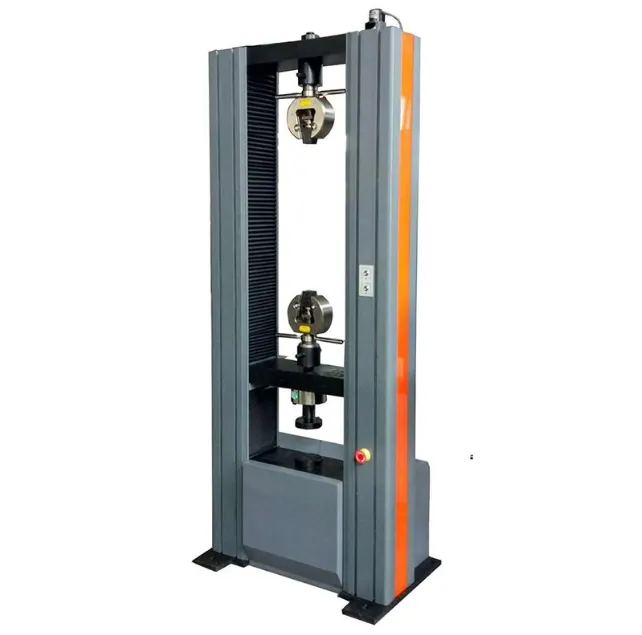Precision Under Pressure: Modern Tensile Testing Machines
In today’s fast-paced industrial landscape, the need for high-performance material testing tools is more crucial than ever. Industries such as construction, automotive, aerospace, and textiles depend on reliable and precise equipment to ensure their products meet stringent safety and quality standards. At the heart of this process are tensile testing machines, designed to measure material properties such as tensile strength, shear strength, and elongation under stress.

Understanding Tensile Tester Shear Strength
One of the most critical properties tested by a tensile tester is shear strength. Shear strength measures a material's ability to withstand forces that act parallel to its surface, a property crucial in applications like metal joining, composite bonding, and load-bearing structures.
Advanced electromechanical universal tensile testers are specifically designed to provide highly accurate shear strength measurements. These machines are equipped with precision load cells and sophisticated software, ensuring consistent results across a range of materials, from metals to polymers. Engineers use this data to design safer products, optimize material selection, and ensure compliance with industry regulations.
Manual Tensile Tester: A Reliable Choice
For small-scale operations or budget-conscious labs, a manual tensile tester offers a cost-effective and dependable solution. While it lacks the automation and throughput of its advanced counterparts, the manual tester is highly versatile and suitable for applications where precision and control are more important than speed.
Mechanical tensile testers, a type of manual system, are particularly popular in educational institutions and smaller labs. These machines provide a hands-on approach to material testing, allowing operators to develop a deeper understanding of the testing process. Modern models often include digital readouts and customizable configurations, bridging the gap between traditional testing methods and modern technology.
Electromechanical Universal Tensile Tester: The Modern Standard
នេះ។ electromechanical universal tensile tester has become a staple in material testing laboratories. Known for its versatility, this equipment is capable of performing tensile, compression, flexural, and other mechanical tests. Its adaptability makes it ideal for industries ranging from aerospace to biomedical engineering.
These testers come with automated controls, high-precision load cells, and advanced software for real-time data analysis. By automating the testing process, they eliminate human error and ensure repeatable, reliable results. Investing in an electromechanical universal tensile tester not only improves testing efficiency but also enhances product quality and customer satisfaction.
Mechanical Tensile Tester: Traditional Durability
For heavy-duty applications and harsh environments, the mechanical tensile tester remains a trusted option. Its robust design and straightforward operation make it ideal for industries requiring consistent performance in challenging conditions.
While traditionally fully manual, many mechanical tensile testers now feature digital enhancements, such as data logging and analysis software. This integration of old and new technologies provides users with the reliability of traditional systems and the accuracy of modern advancements. Mechanical testers are particularly valuable in industries where durability and simplicity are paramount.
The Importance of a Tensile Force Tester
A tensile force tester is essential for measuring a material's ability to withstand tension. This property is crucial in industries producing products like cables, fabrics, and other materials subjected to tensile loads.
Today’s tensile force testers are equipped with intuitive interfaces, adjustable settings, and precise measurement capabilities. They can accommodate a wide range of sample sizes and types, from laboratory specimens to industrial components. By providing detailed insights into a material’s performance, these machines help businesses optimize their production processes and maintain high quality.
Modern tensile testing machines have redefined the standards for material testing, offering unparalleled precision and reliability. From assessing tensile tester shear strength to leveraging the efficiency of an electromechanical universal tensile tester, these tools play a critical role in ensuring product safety and quality. While manual tensile testers and mechanical tensile testers provide affordability and control, advanced systems like tensile force testers offer unmatched capabilities for industrial applications. By choosing the right equipment, businesses can achieve accurate results, improve operational efficiency, and maintain a competitive edge in their respective industries. Investing in cutting-edge tensile testing technology is more than a choice—it’s a necessity for innovation, compliance, and success. Whether you’re pushing the limits of materials for aerospace or crafting durable textiles for everyday use, precision under pressure is the foundation of progress.
-
Why the Conductor Resistance Constant Temperature Measurement Machine Redefines Precision
ព័ត៌មានJun.20,2025
-
Reliable Testing Starts Here: Why the High Insulation Resistance Measuring Instrument Is a Must-Have
ព័ត៌មានJun.20,2025
-
Flexible Cable Flexing Test Equipment: The Precision Standard for Cable Durability and Performance Testing
ព័ត៌មានJun.20,2025
-
Digital Measurement Projector: Precision Visualization for Modern Manufacturing
ព័ត៌មានJun.20,2025
-
Computer Control Electronic Tensile Tester: Precision and Power for the Modern Metal Industry
ព័ត៌មានJun.20,2025
-
Cable Spark Tester: Your Ultimate Insulation Assurance for Wire and Cable Testing
ព័ត៌មានJun.20,2025
 Copyright © 2025 Hebei Fangyuan Instrument & Equipment Co.,Ltd. All Rights Reserved. Sitemap | Privacy Policy
Copyright © 2025 Hebei Fangyuan Instrument & Equipment Co.,Ltd. All Rights Reserved. Sitemap | Privacy Policy
